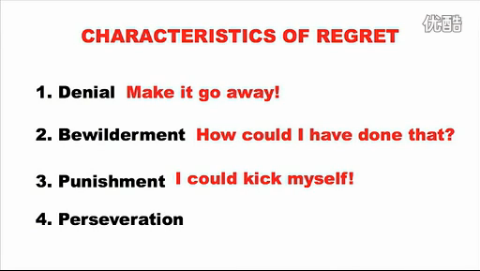(单词翻译:单击)
演讲文本
The second characteristic component of regret is a sense of bewilderment.
后悔第二波就是困惑感。
So the other thing I thought about there in my bedroom that night was, "How could I have done that? What was I thinking?"
那天晚上我在卧室里想的就是“我怎么做出这样的事情?我到底在想什么?”
This real sense of alienation from the part of us that made a decision we regret.
这是尝试把做出后悔决定的那部分自己跟自身孤立起来。
We can't identify with that part. We don't understand that part.
我们无法认同那部分自己。无法理解那部分。
And we certainly don't have any empathy for that part-which explains the third consistent component of regret, which is an intense desire to punish ourselves.
而我们绝对不喜欢那部分自己—这就带来了后悔第三波,一种强烈的自我惩罚的愿望。
That's why, in the face of our regret, the thing we consistently say is, "I could have kicked myself."
这就是我们面对悔恨的时候,总是自我责难:“真想抽自己一巴掌!”

The fourth component here is that regret is what psychologists call perseverative.
第四波就是心理学家所谓的表现执拗。
To perseverate means to focus obsessively and repeatedly on the exact same thing.
表现执拗就是不断地强迫性地重复同一件事情。
Now the effect of perseveration is to basically take these first three components of regret and put them on an infinite loop.
而表现执拗的结果就是,持续不停地重复后悔的前三个阶段。
So it's not that I sat there in my bedroom that night, thinking, "Make it go away."
那天晚上我就坐在卧室里想“我不要这样!”
It's that I sat there and I thought, "Make it go away. Make it go away. Make it go away. Make it go away."
我就这么坐着一直想“不要这样,不要这样,不要这样,不要这样。”
So if you look at the psychological literature, these are the four consistent defining components of regret.
如果你查看心理学文献,这些就是悔恨的四个阶段。
视频及简介
演讲简介:
我们从小被教育要生而无悔。但是Kathryn Schulz用她的纹身举例,告诉我们怎样接受后悔。


